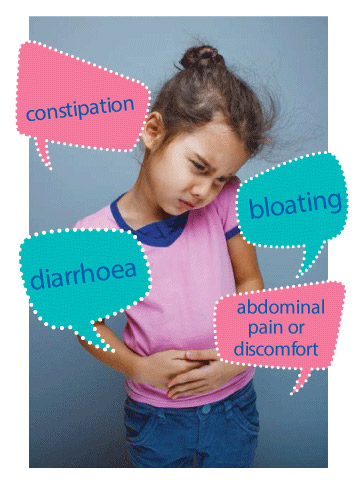Irritable bowel syndrome (IBS) is a not a disease in itself – it is a collection of symptoms that usually happen together. It should be noted that while IBS can cause your child to show frequent symptoms, his gastrointestinal (GI) tract is not physically damaged.
Did you know?
The cause of IBS is unknown and has been linked to both physical and psychological (or mental) causes.
The various symptoms that are related to IBS include:

If your child suffers from any one or a combination of these symptoms, at least once a week for about two months, then there is a high probability that he is suffering from IBS. Do consult your paediatrician to get a clearer idea of how you can find out for sure and to learn what you can do about it.
Possible causes
Researchers are still struggling to understand what causes IBS. Some of the possible causes that have been identified include:
-
- Brain-gut connection
The link between the brain and the nerves in the digestive system may develop problems which lead to IBS symptoms, e.g. diarrhoea or abdominal pain.
-
- GI tract problems
A child with IBS may have a different sort of problem with the normal function of his colon. If the muscles contract too slowly, it could cause constipation and if they contract too quickly may lead to diarrhoea. Abdominal pain may happen if there are any sudden, strong contractions. Stress has been linked to increased contractions which lead to diarrhoea.
-
- Hypersensitivity
Children with IBS tend to show greater sensitivity to abdominal pain than children without IBS.
-
- Mental health problems
It has been shown that IBS is linked to the state of a child’s mental health, and children with psychological issues such as anxiety and depression tend to be more susceptible to IBS.
-
- Gender and genetics
Studies have yet to determine a definite genetic link for IBS but statistically, IBS does seem to be more common among families that have a history of GI problems. In children, IBS seems to affect boys and girls equally, but adult women seem to account for a higher percentage of IBS patients. However, the cause could be environmental or the result of heightened awareness of GI symptoms.
Prevention and treatment of IBS
Since stress is often a major factor with IBS, teaching your child how to handle it is a good idea. A simple method is to simply talk to him about any problems he may face. Get him to reflect on things such as:
- Is he putting too much pressure on himself at school?
- Is he getting enough sleep?
- Does he get enough time with physical activities such as riding a bicycle or playing futsal?
- Does he skip breakfast? Does he eat too quickly or simply gulp his food down?
- Is he getting bullied or having trouble with other students?
Treatment typically consists of making changes to your child’s eating habits, i.e. adjusting his diet or nutritional intake. This includes taking smaller portions as large portions may cause cramping and diarrhoea. It should also help to take meals that are low in fat and high in carbohydrates, e.g. rice, whole-grain breads/cereals, fruits, and vegetables.
You may want to limit or avoid certain foods that are high in fat, contain caffeine, or anything with large amounts of artificial sweeteners. Some foods may also contribute to excess gas, such as beans and cabbage, so you may want to avoid these foods and/or replace them with other foods.
Probiotics can also be included as part of his diet. His paediatrician may also prescribe medications or some other form of therapy if any mental health problems are suspected.
An educational contribution by Malaysian Paediatric Association.






Comments